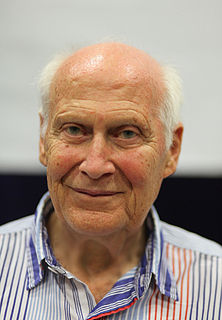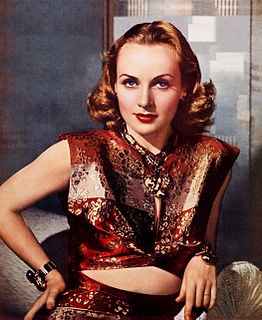A Quote by Lawrence Ferlinghetti
We'd like to just write nothing but lyric poetry. The trouble is, the individual is going along intent on his own personal gratifications and love affairs and financial affairs and everything else. But loping alongside him is this fascist lout who keeps trying to take over. And if you keep ignoring him, he gets bigger and bigger, so every once in a while the free individual has to turn away from his private pursuits and give this fascist lout a few clouts, and beat him down to size.
Quote Topics
Affairs
Along
Alongside
And Love
Away
Beat
Bigger
Down
Else
Every
Everything
Everything Else
Fascist
Few
Financial
Free
Gets
Give
Going
Him
His
Ignoring
Individual
Intent
Just
Keep
Keeps
Like
Love
Love Affair
Lyric
Lyric Poetry
Nothing
Once
Over
Own
Personal
Poetry
Private
Size
Take
Trouble
Trying
Turn
While
Write
Related Quotes
When the family has been brought into its natural order, the individual can leave it behind him while still feeling the strength of his family supporting him. Only when the connection to his family is acknowledged, and the person's responsibility seen clearly and then distributed, can the individual feel unburdened and go about his personal affairs without anything from the past weighing him down or holding him back.
In a sense, the religious person must have no real views of his own and it is presumptuous of him, in fact, to have any. In regard to sex-love affairs, to marriage and family relations, to business, to politics, and to virtually everything else that is important in his life, he must try to discover what his god and his clergy would like him to do; and he must primarily do their bidding.
We had a great connection with Pedro Almodovar from the beginning. Even before I met him, it was so strange. I felt like I already knew him. I loved him even before I met him. It was so powerful. And when I looked at him in the eyes, this was the feeling that I knew I was going to have with him. It gets bigger and bigger every day. I adore him. It's much more than working together. He's a really special person in my life.
The private citizen today has come to feel rather like a deaf spectator in the back row, who ought to keep his mind on the mystery off there, but cannot quite manage to keep awake. He knows he is somehow affected by what is going on. Rules and regulations continually, taxes annually and wars occasionally remind him that he is being swept along by great drifts of circumstance. Yet these public affairs are in no convincing way his affairs. They are for the most part invisible. They are managed, if they are managed at all, at distant centers, from behind the scenes, by unnamed powers.
If some small storekeeper somewhere decides he's not going to pay the money, the Godfather doesn't let him get away with it. The money doesn't mean anything to him, but he sends in his goons to beat him to a pulp. You have to establish credibility, otherwise conformity to your orders will tend to erode. International affairs runs in much the same way.
It is possible that an individual may be successful, largely because he conserves all his powers for individual achievement and does not put any of his energy into the training which will give him the ability to act with others. The individual acts promptly, and we are dazzled by his success while only dimly conscious of the inadequacy of his code.
What frightens me about America today is that in the large majority there is no active sense of the value of the individual: few citizens feel that they are the Republic, responsible for what happens. And when the individual in a democracy ceases to feel his importance, then there is grave danger that he will give over his freedom, if not to a Fascist State, then to the advertising men or Publicity Agents or to the newspaper he happens to read.
Happiness has to be installed in each person as a state of affairs completely cut off from the process that brought it about and, in particular, from the real situation. Man has to be affected with happiness. It is a tonality given to him. Contradiction: if one does take care to give him happiness, it is because he is a free creature--but in order to give it to him, one turns him into an object.
Or perhaps a widow found him and took him in: brought him an easy chair, changed his sweater every morning, shaved his face until the hair stopped growing, took him faithfully to bed with her every night, whispered sweet nothings into what was left of his ear, laughed with him over black coffee, cried with him over yellowing pictures, talked greenly about having kids of her own, began to miss him before she became sick, left him everything in her will, thought of only him as she died, always knew he was fiction but believed in him anyway.
It is not the right of property which is protected, but the right to property. Property, per se, has no rights; but the individual - the man - has three great rights, equally sacred from arbitrary interference: the right to his life, the right to his liberty, the right to his property The three rights are so bound together as to be essentially one right. To give a man his life but to deny him his liberty, is to take from him all that makes his life worth living. To give him his liberty but take from him the property which is the fruit and badge of his liberty is to still leave him a slave.
The average American is just like the child in the family. You give him some responsibility and he is going to amount to something. He is going to do something. If, on the other hand, you make him completely dependent and pamper him and cater to him too much, you are going to make him soft, spoiled and eventually a very weak individual.
Some souls think that the Holy Spirit is very far away, far, far, up above. Actually he is, we might say, the divine Person who is most closely present to the creature. He accompanies him everywhere. He penetrates him with himself. He calls him, he protects him. He makes of him his living temple. He defends him. He helps him. He guards him from all his enemies. He is closer to him than his own soul. All the good a soul accomplishes, it carries out under his inspiration, in his light, by his grace and his help.






































